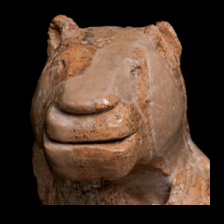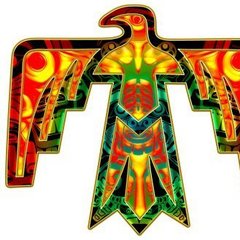-
Content count
2,028 -
Joined
-
Last visited
-
Days Won
48
About stirling
-
Rank
Soto Zen Teacher, Shunryu Suzuki Lineage
Profile Information
-
Gender
Sunyata
Recent Profile Visitors
11,009 profile views
-
Yes, this is my interpretation of the Fall as well. There are tons of examples of non-dual allusion in the bible, actually. Find 'em all and get a gold star!
-
-
A complicated question without some definitions. When I think about a "higher will" I think of the "will" (if such a thing were choreographed or planned) of the unity - the Dao, or the dharmakaya, or Crowley's "Do As Thou Wilt Shall Be the Whole of the Law". The "lower" will is perhaps the will we all believe we have as separate beings in a world of separate things - our thoughts and choice. As it happens, these are a delusion, whether you look at it from a non-dual perspective (Buddhism, Sufism, Daoism, etc.) or, for example, a scientific perspective. Example: Science has actually proven that your hand starts motion BEFORE you decide to pick up a glass, and that, for MOST people we actually perceive reality as much as 1/3rd of a second behind what is actually happening, INCLUDING the seemingly personally directed movement of our own bodies. (The exception is of those who are not continually pre-occupied by their thoughts). Further, no source for our thoughts has ever been discovered - there is only a correlation with thoughts arising and certain kinds of brain activity. Are they even really "our" thoughts? Most dedicated meditators have skills and experience to throw serious shade on this idea. Add to the fact that some function of the mind (or something) actually fills in the center of our vision, and you can be sure that we are likely fabricating a reality that doesn't exist in the way that we think it does. Yes there is science for all of this. As for "higher" or "divine will", this is the idea that there is some "thing" (god or whatever) has a "plan" of some sort and acts through us. This is equally flawed. Who is this we are talking about? Where are they? My suggestion is that one sticks with what can be perceived, since the reality of these ideas is actually perceptible by most with a little effort. Again, meditation is the tool of choice. To see the reality of this is a fairly simple endeavor. The cultivation of seeing from enlightened mind is actually possible when there is identification as simple awareness. You can see, moment to moment, how you construct your relative reality from your thinking process, and how, when it is arrested, that relative story of doing and thinking and subject/object relationships drops away when you stop putting effort into them. What is left is simply things as they are. That "things as they are" is in constant flux. It is change, happening in this moment. This is what your Dao, dharmakaya, or Crowley's "Do As Thou Wilt Shall Be the Whole of the Law" ARE. What does enlightenment reveal? Astonishingly, it reveals what what you can see is reality, when you look at it without your thinking mind. It reveals that there is the moment, here, now. There is what is happening now. There is an awareness of that, a simple, joyful being. It has never been hidden from you, and isn't even that hard to see, really. All of your thinking, brooding, and conceptualizing has never gotten you closer to seeing it.
-
Reality is just reality. The world is just doing it's thing. Your "suffering" is created by your resistance to accepting the reality of this moment. The "deep meaning of things" in this case is having the Wisdom to see and rest in the Tao, or "emptiness". Being present with reality as it is now is "alignment" with the Tao. The idea that what you like is "dharma", and what you don't like is "adharma" only exists in your mind. The suffering of attachment or aversion to what is happening is entirely yours. It is an entirely relative mental construct. A terrorist might decide that blowing up a marketplace full of women and children to resist his current government or religious leadership is a good thing. Another might think that action is an unspeakable horror. Invading foreign nations, fighting world wars, genetic engineering - these are all things that have been called good OR bad depending on the person who observes. This doesn't mean we can't work to be kind, or support causes that bring peace and harmony to the world, but having some wisdom about the nature of reality CAN mean that we don't get lost in our dialog about attachment or aversion to the outcomes. It is folly to think that world will ever be entirely peaceful, or meet our personal requirements for what is "perfect". The world has always been like this, and always will be.
-
Excellent work team!
-
Two!
-
I am no longer practicing, but actualizing enlightenment. One can actualize enlightenment by dropping all contrived thoughts, ideas, and practices. From the viewpoint of awareness it can be seen that all appearances in consciousness, including the "self", thoughts, and other worldly phenomena arise and When you practice in this way even the walled-in concept of enlightenment drops away.
-
I would be interested in understanding why all of the posts have disappeared. Has there been some change in interpretation or understanding, or...?
-
You can't separate non-duality from duality. The ONE gives birth to the other. They are not a duality. If all appearances are Buddha, or Bhagavan, all appearances are therefore teachers. If one is open to learning about their own attachment and aversion when they see what they think of as "adharma", to see where their own struggle is centered, they are being shaped by dharma.
-
It's hard to parse, but "adharma" is ALSO dharma.
-
When your meditation results in periods of stillness you will start to notice that thoughts arise spontaneously of their own accord... without your effort. With some practice you will learn to just watch thoughts arise and more and more occasionally pass, but without you having a 2nd thought that builds them into your mental dialog. At that time you have begun to sometimes identify as bare awareness in your sitting, rather than as the thoughts that you thought were "you". When you can rest in this perspective (that which watches phenomena and thoughts arise and pass) you can be 100% present for periods of time. Most students, with some guidance and genuine practice can come to this in its basic form in 2 weeks to a month of daily sitting. Some just stumble upon it. Having it pointed out, as I have, helps. Learning to see thoughts as something you witness, rather than "I" is the first step. If you are witnessing the thought, it obviously isn't "you", it is just another "object", like an orange on your table, or a mote of dust shifting lazily in the sun. Learning this process isn't something "you" do, it is what happens when you take the time to practice and learn to STOP doing. "You" will NEVER "do" it. Yes, thinking about it too much is a problem. It sounds like you are an experienced meditator, you have probably crossed this ground before many times, but without the perspective of teaching. It happens all the time in meditation, but we don't know to look for it. See how far you can get with the instruction above, and feel free to tag me in this thread, or message me if you need more guidance.
-
If you read the Heart Sutra from the perspective of realization it is as clean and clear as a mountain stream. I don't know of any non-dual expression that is more concise and to the point. Another in the same league (IMO) is the Tsin Tsin Ming by Tseng T'san, not written by the Buddha but rather a Ch'an patriarch much much later. Dharma is being penned by living beings every day, all over the world. It isn't important if the Buddha said it, or if the guy that runs the hardware store down the street said it. There have been countless enlightened beings since the Buddha, all Buddhas themselves. They walk the streets of your town, tip their hats, and frequent the aformentioned hardware store to see their dharma brother. Even their simple kindness and patience is dharma.
-
I think you misunderstand. I am saying that the Gnowledge (dharma of all kinds) points to something that is essentially ineffable. Both emphasize that Brahman is the source of all awareness, not an object to be known. This is true in ALL non-dual traditions, and ineffability is even mentioned in Judaism and Christianity. This isn't a bug, it is a feature. It is a pointer for those who genuinely seek to understand to look beyond concepts. True realization, even of the nature of "God", isn't conceptual knowledge. It isn't something you can just tell someone else, or everyone would be sharing it.
-
The Buddha purposely had the "unanswerable questions". https://en.wikipedia.org/wiki/The_unanswerable_questions These included cosmologies of all kinds. The reason for this is that, where there is realization, it is obvious that these questions are being posed from a logic and world view that has been seen to be a mirage - a delusion. Even Buddhism itself is eventually seen to be a constructed idea of reality, not non-dual reality itself.

















